From Data to Insights: Future Trends of AI in Qualitative Market Research
From Data to Insights: Future Trends of AI in Qualitative Market Research
From Data to Insights: Future Trends of AI in Qualitative Market Research



The landscape of qualitative market research is undergoing a transformative shift with the integration of AI technologies. As market research agencies strive to gain deeper insights from qualitative data, AI-powered solutions are becoming indispensable. Conversational AI transforms customer interactions with hyper-personalized experiences through advanced technologies like Natural Language Processing (NLP) and machine learning.
The AI ecosystem understands customer needs, provides 24/7 instant responses, and leverages data for personalized recommendations. By automating routine tasks and offering seamless integration across platforms, they enhance efficiency, engagement, and scalability. Continuous learning ensures improved accuracy over time, fostering strong customer relationships and loyalty. Conversational AI solutions like Metaforms lead this transformation, elevating customer service powered by Artificial Intelligence.
This blog post delves into the future trends of AI in qualitative market research, illustrating how these advancements are reshaping the industry, addressing key challenges, and unlocking new potentials for researchers.
The Evolution of AI in Qualitative Market Research
AI is a game-changer in market research. Traditional qualitative methods, while effective, often fall short in handling large datasets and providing real-time insights. AI bridges this gap by automating data collection, analysis, and interpretation, enabling researchers to focus on strategic decision-making.
Future Trends in AI for Qualitative Market Research
Enhanced Data Analysis: AI algorithms can sift through vast amounts of qualitative data to identify patterns and trends that would be nearly impossible to detect manually. This includes sentiment analysis, theme extraction, and predictive analytics.
Real-Time Insights: AI-powered tools offer real-time data processing, allowing researchers to gain immediate insights and make quicker decisions. This agility is crucial in today's fast-paced market environments.
Personalized Surveys: With AI, surveys can be tailored to individual respondents based on their previous answers and behaviors, increasing engagement and the quality of responses.
Voice and Text Analysis: Advanced AI systems can analyze voice and text data, providing deeper insights into consumer emotions and intentions. This is particularly useful in focus groups and in-depth interviews.
AI-Driven Recruitment: Recruiting the right participants for qualitative research is often challenging. AI streamlines this process by identifying and engaging suitable candidates more efficiently.
Automated Transcription and Translation: AI tools can automatically transcribe and translate interview data, saving time and reducing the risk of human error.
Predictive Analytics: AI can predict future trends and consumer behaviors based on historical data, providing a competitive edge to businesses.
Enhanced Data Security: AI systems can detect and prevent fraudulent activities, ensuring the integrity of qualitative data.
Integration with Other Technologies: AI can seamlessly integrate with other technologies like blockchain for data security and AR/VR for immersive qualitative research experiences.
Cost Efficiency: By automating routine tasks, AI reduces the need for extensive manual labor, resulting in significant cost savings for market research agencies.
Addressing Industry-Specific Challenges
AI is particularly effective in tackling industry-specific challenges in qualitative market research:
Healthcare: In the healthcare sector, AI can help in recruiting niche participants like patients with specific conditions, ensuring data accuracy through advanced validation techniques. AI can also assist in analyzing complex medical terminologies and patient feedback, providing valuable insights for improving healthcare services and products.
Logistics: In the logistics sector, AI optimizes panel recruitment and engagement by predicting respondent behaviors and preferences. It can analyze supply chain feedback and operational data to identify inefficiencies and areas for improvement, enhancing overall logistics management.
Retail: AI analyzes customer feedback in real-time, identifying trends and improving customer experience strategies. Retailers can use AI to understand consumer buying behaviors, preferences, and sentiments, helping them to tailor their marketing strategies and product offerings effectively.
The Role of AI-Native Survey Builders
Metaforms’ AI-native survey builder exemplifies the integration of AI in qualitative research. It simplifies survey creation, ensures high data quality, and provides actionable insights swiftly. By leveraging AI, researchers can design more engaging surveys, recruit the right participants, and analyze data more effectively.
Survey Creation: AI assists in creating surveys that are engaging and tailored to the target audience. It can suggest question types, wording, and structures that are most likely to elicit valuable responses.
Participant Recruitment: AI-driven recruitment tools can identify and reach out to potential participants who meet specific criteria, ensuring that the survey panel is representative and relevant.
Data Analysis: AI can process and analyze large volumes of qualitative data quickly, identifying patterns, trends, and insights that may not be immediately apparent through manual analysis.
Future Trends and the Path Forward
The future of qualitative market research lies in the seamless integration of AI. As AI technologies continue to evolve, they will offer even more sophisticated tools for data collection and analysis. Researchers will be able to conduct more comprehensive studies with less effort, gaining deeper insights into consumer behavior and market trends.
AI and Big Data: The combination of AI and big data will enable researchers to analyze larger datasets than ever before, providing more comprehensive insights and improving the accuracy of their findings.
Machine Learning: As machine learning algorithms become more advanced, they will be able to provide even more accurate and nuanced insights, helping researchers to understand complex patterns and trends in their data.
Natural Language Processing (NLP): NLP technology will continue to improve, allowing AI to understand and interpret human language more accurately. This will enable more sophisticated analysis of open-ended survey responses and other qualitative data.
Conclusion: Future Trends of AI in Qualitative Market Research
AI is revolutionizing qualitative market research by providing powerful tools for data collection, analysis, and interpretation. As these technologies continue to advance, they will unlock new possibilities for researchers, enabling them to derive deeper insights and make more informed decisions.
Conversational AI is transforming customer interactions by delivering hyper-personalized, efficient, and engaging experiences. It leverages advanced technologies like NLP, predictive analytics, and machine learning to understand and meet customer needs proactively. As businesses continue to adopt and refine AI-driven solutions, the future of customer interactions looks increasingly promising, with even greater levels of personalization and engagement on the horizon.
Metaforms’ AI-native survey builder is leading this transformation, offering market researchers the tools they need to stay ahead in an increasingly competitive landscape. Embrace the future of market research with AI and unlock the full potential of your qualitative data.
The landscape of qualitative market research is undergoing a transformative shift with the integration of AI technologies. As market research agencies strive to gain deeper insights from qualitative data, AI-powered solutions are becoming indispensable. Conversational AI transforms customer interactions with hyper-personalized experiences through advanced technologies like Natural Language Processing (NLP) and machine learning.
The AI ecosystem understands customer needs, provides 24/7 instant responses, and leverages data for personalized recommendations. By automating routine tasks and offering seamless integration across platforms, they enhance efficiency, engagement, and scalability. Continuous learning ensures improved accuracy over time, fostering strong customer relationships and loyalty. Conversational AI solutions like Metaforms lead this transformation, elevating customer service powered by Artificial Intelligence.
This blog post delves into the future trends of AI in qualitative market research, illustrating how these advancements are reshaping the industry, addressing key challenges, and unlocking new potentials for researchers.
The Evolution of AI in Qualitative Market Research
AI is a game-changer in market research. Traditional qualitative methods, while effective, often fall short in handling large datasets and providing real-time insights. AI bridges this gap by automating data collection, analysis, and interpretation, enabling researchers to focus on strategic decision-making.
Future Trends in AI for Qualitative Market Research
Enhanced Data Analysis: AI algorithms can sift through vast amounts of qualitative data to identify patterns and trends that would be nearly impossible to detect manually. This includes sentiment analysis, theme extraction, and predictive analytics.
Real-Time Insights: AI-powered tools offer real-time data processing, allowing researchers to gain immediate insights and make quicker decisions. This agility is crucial in today's fast-paced market environments.
Personalized Surveys: With AI, surveys can be tailored to individual respondents based on their previous answers and behaviors, increasing engagement and the quality of responses.
Voice and Text Analysis: Advanced AI systems can analyze voice and text data, providing deeper insights into consumer emotions and intentions. This is particularly useful in focus groups and in-depth interviews.
AI-Driven Recruitment: Recruiting the right participants for qualitative research is often challenging. AI streamlines this process by identifying and engaging suitable candidates more efficiently.
Automated Transcription and Translation: AI tools can automatically transcribe and translate interview data, saving time and reducing the risk of human error.
Predictive Analytics: AI can predict future trends and consumer behaviors based on historical data, providing a competitive edge to businesses.
Enhanced Data Security: AI systems can detect and prevent fraudulent activities, ensuring the integrity of qualitative data.
Integration with Other Technologies: AI can seamlessly integrate with other technologies like blockchain for data security and AR/VR for immersive qualitative research experiences.
Cost Efficiency: By automating routine tasks, AI reduces the need for extensive manual labor, resulting in significant cost savings for market research agencies.
Addressing Industry-Specific Challenges
AI is particularly effective in tackling industry-specific challenges in qualitative market research:
Healthcare: In the healthcare sector, AI can help in recruiting niche participants like patients with specific conditions, ensuring data accuracy through advanced validation techniques. AI can also assist in analyzing complex medical terminologies and patient feedback, providing valuable insights for improving healthcare services and products.
Logistics: In the logistics sector, AI optimizes panel recruitment and engagement by predicting respondent behaviors and preferences. It can analyze supply chain feedback and operational data to identify inefficiencies and areas for improvement, enhancing overall logistics management.
Retail: AI analyzes customer feedback in real-time, identifying trends and improving customer experience strategies. Retailers can use AI to understand consumer buying behaviors, preferences, and sentiments, helping them to tailor their marketing strategies and product offerings effectively.
The Role of AI-Native Survey Builders
Metaforms’ AI-native survey builder exemplifies the integration of AI in qualitative research. It simplifies survey creation, ensures high data quality, and provides actionable insights swiftly. By leveraging AI, researchers can design more engaging surveys, recruit the right participants, and analyze data more effectively.
Survey Creation: AI assists in creating surveys that are engaging and tailored to the target audience. It can suggest question types, wording, and structures that are most likely to elicit valuable responses.
Participant Recruitment: AI-driven recruitment tools can identify and reach out to potential participants who meet specific criteria, ensuring that the survey panel is representative and relevant.
Data Analysis: AI can process and analyze large volumes of qualitative data quickly, identifying patterns, trends, and insights that may not be immediately apparent through manual analysis.
Future Trends and the Path Forward
The future of qualitative market research lies in the seamless integration of AI. As AI technologies continue to evolve, they will offer even more sophisticated tools for data collection and analysis. Researchers will be able to conduct more comprehensive studies with less effort, gaining deeper insights into consumer behavior and market trends.
AI and Big Data: The combination of AI and big data will enable researchers to analyze larger datasets than ever before, providing more comprehensive insights and improving the accuracy of their findings.
Machine Learning: As machine learning algorithms become more advanced, they will be able to provide even more accurate and nuanced insights, helping researchers to understand complex patterns and trends in their data.
Natural Language Processing (NLP): NLP technology will continue to improve, allowing AI to understand and interpret human language more accurately. This will enable more sophisticated analysis of open-ended survey responses and other qualitative data.
Conclusion: Future Trends of AI in Qualitative Market Research
AI is revolutionizing qualitative market research by providing powerful tools for data collection, analysis, and interpretation. As these technologies continue to advance, they will unlock new possibilities for researchers, enabling them to derive deeper insights and make more informed decisions.
Conversational AI is transforming customer interactions by delivering hyper-personalized, efficient, and engaging experiences. It leverages advanced technologies like NLP, predictive analytics, and machine learning to understand and meet customer needs proactively. As businesses continue to adopt and refine AI-driven solutions, the future of customer interactions looks increasingly promising, with even greater levels of personalization and engagement on the horizon.
Metaforms’ AI-native survey builder is leading this transformation, offering market researchers the tools they need to stay ahead in an increasingly competitive landscape. Embrace the future of market research with AI and unlock the full potential of your qualitative data.
The landscape of qualitative market research is undergoing a transformative shift with the integration of AI technologies. As market research agencies strive to gain deeper insights from qualitative data, AI-powered solutions are becoming indispensable. Conversational AI transforms customer interactions with hyper-personalized experiences through advanced technologies like Natural Language Processing (NLP) and machine learning.
The AI ecosystem understands customer needs, provides 24/7 instant responses, and leverages data for personalized recommendations. By automating routine tasks and offering seamless integration across platforms, they enhance efficiency, engagement, and scalability. Continuous learning ensures improved accuracy over time, fostering strong customer relationships and loyalty. Conversational AI solutions like Metaforms lead this transformation, elevating customer service powered by Artificial Intelligence.
This blog post delves into the future trends of AI in qualitative market research, illustrating how these advancements are reshaping the industry, addressing key challenges, and unlocking new potentials for researchers.
The Evolution of AI in Qualitative Market Research
AI is a game-changer in market research. Traditional qualitative methods, while effective, often fall short in handling large datasets and providing real-time insights. AI bridges this gap by automating data collection, analysis, and interpretation, enabling researchers to focus on strategic decision-making.
Future Trends in AI for Qualitative Market Research
Enhanced Data Analysis: AI algorithms can sift through vast amounts of qualitative data to identify patterns and trends that would be nearly impossible to detect manually. This includes sentiment analysis, theme extraction, and predictive analytics.
Real-Time Insights: AI-powered tools offer real-time data processing, allowing researchers to gain immediate insights and make quicker decisions. This agility is crucial in today's fast-paced market environments.
Personalized Surveys: With AI, surveys can be tailored to individual respondents based on their previous answers and behaviors, increasing engagement and the quality of responses.
Voice and Text Analysis: Advanced AI systems can analyze voice and text data, providing deeper insights into consumer emotions and intentions. This is particularly useful in focus groups and in-depth interviews.
AI-Driven Recruitment: Recruiting the right participants for qualitative research is often challenging. AI streamlines this process by identifying and engaging suitable candidates more efficiently.
Automated Transcription and Translation: AI tools can automatically transcribe and translate interview data, saving time and reducing the risk of human error.
Predictive Analytics: AI can predict future trends and consumer behaviors based on historical data, providing a competitive edge to businesses.
Enhanced Data Security: AI systems can detect and prevent fraudulent activities, ensuring the integrity of qualitative data.
Integration with Other Technologies: AI can seamlessly integrate with other technologies like blockchain for data security and AR/VR for immersive qualitative research experiences.
Cost Efficiency: By automating routine tasks, AI reduces the need for extensive manual labor, resulting in significant cost savings for market research agencies.
Addressing Industry-Specific Challenges
AI is particularly effective in tackling industry-specific challenges in qualitative market research:
Healthcare: In the healthcare sector, AI can help in recruiting niche participants like patients with specific conditions, ensuring data accuracy through advanced validation techniques. AI can also assist in analyzing complex medical terminologies and patient feedback, providing valuable insights for improving healthcare services and products.
Logistics: In the logistics sector, AI optimizes panel recruitment and engagement by predicting respondent behaviors and preferences. It can analyze supply chain feedback and operational data to identify inefficiencies and areas for improvement, enhancing overall logistics management.
Retail: AI analyzes customer feedback in real-time, identifying trends and improving customer experience strategies. Retailers can use AI to understand consumer buying behaviors, preferences, and sentiments, helping them to tailor their marketing strategies and product offerings effectively.
The Role of AI-Native Survey Builders
Metaforms’ AI-native survey builder exemplifies the integration of AI in qualitative research. It simplifies survey creation, ensures high data quality, and provides actionable insights swiftly. By leveraging AI, researchers can design more engaging surveys, recruit the right participants, and analyze data more effectively.
Survey Creation: AI assists in creating surveys that are engaging and tailored to the target audience. It can suggest question types, wording, and structures that are most likely to elicit valuable responses.
Participant Recruitment: AI-driven recruitment tools can identify and reach out to potential participants who meet specific criteria, ensuring that the survey panel is representative and relevant.
Data Analysis: AI can process and analyze large volumes of qualitative data quickly, identifying patterns, trends, and insights that may not be immediately apparent through manual analysis.
Future Trends and the Path Forward
The future of qualitative market research lies in the seamless integration of AI. As AI technologies continue to evolve, they will offer even more sophisticated tools for data collection and analysis. Researchers will be able to conduct more comprehensive studies with less effort, gaining deeper insights into consumer behavior and market trends.
AI and Big Data: The combination of AI and big data will enable researchers to analyze larger datasets than ever before, providing more comprehensive insights and improving the accuracy of their findings.
Machine Learning: As machine learning algorithms become more advanced, they will be able to provide even more accurate and nuanced insights, helping researchers to understand complex patterns and trends in their data.
Natural Language Processing (NLP): NLP technology will continue to improve, allowing AI to understand and interpret human language more accurately. This will enable more sophisticated analysis of open-ended survey responses and other qualitative data.
Conclusion: Future Trends of AI in Qualitative Market Research
AI is revolutionizing qualitative market research by providing powerful tools for data collection, analysis, and interpretation. As these technologies continue to advance, they will unlock new possibilities for researchers, enabling them to derive deeper insights and make more informed decisions.
Conversational AI is transforming customer interactions by delivering hyper-personalized, efficient, and engaging experiences. It leverages advanced technologies like NLP, predictive analytics, and machine learning to understand and meet customer needs proactively. As businesses continue to adopt and refine AI-driven solutions, the future of customer interactions looks increasingly promising, with even greater levels of personalization and engagement on the horizon.
Metaforms’ AI-native survey builder is leading this transformation, offering market researchers the tools they need to stay ahead in an increasingly competitive landscape. Embrace the future of market research with AI and unlock the full potential of your qualitative data.

Nine Types of Healthcare and Medical Forms.
Medical forms are a must-have for any healthcare business or practitioner. Learn about the different kinds of medical and healthcare forms.
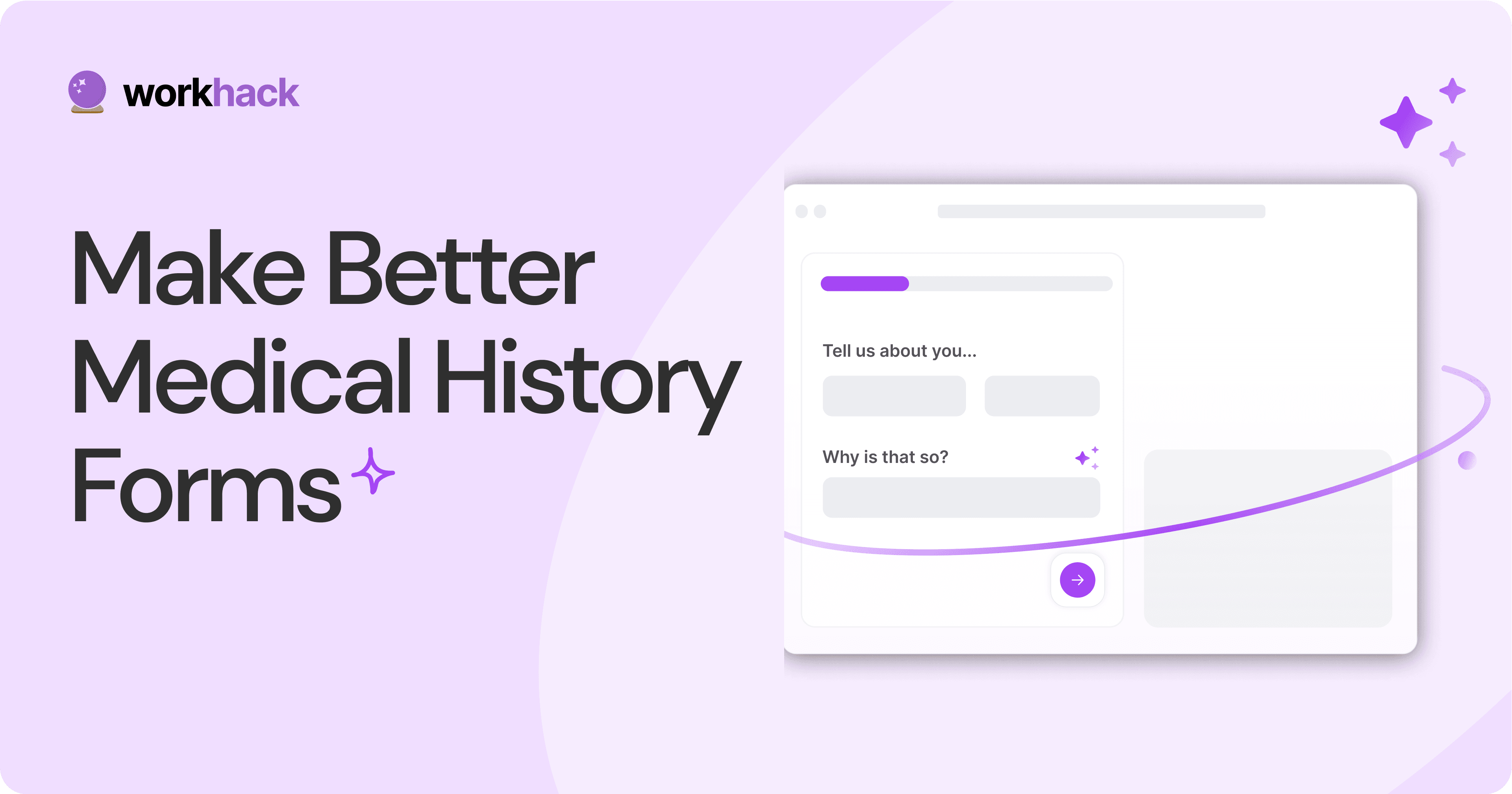
4 Tips for Better Medical History Forms.
Medical history forms are central to patient care, onboarding, and medical administration records. Learn how to make them easier to fill.
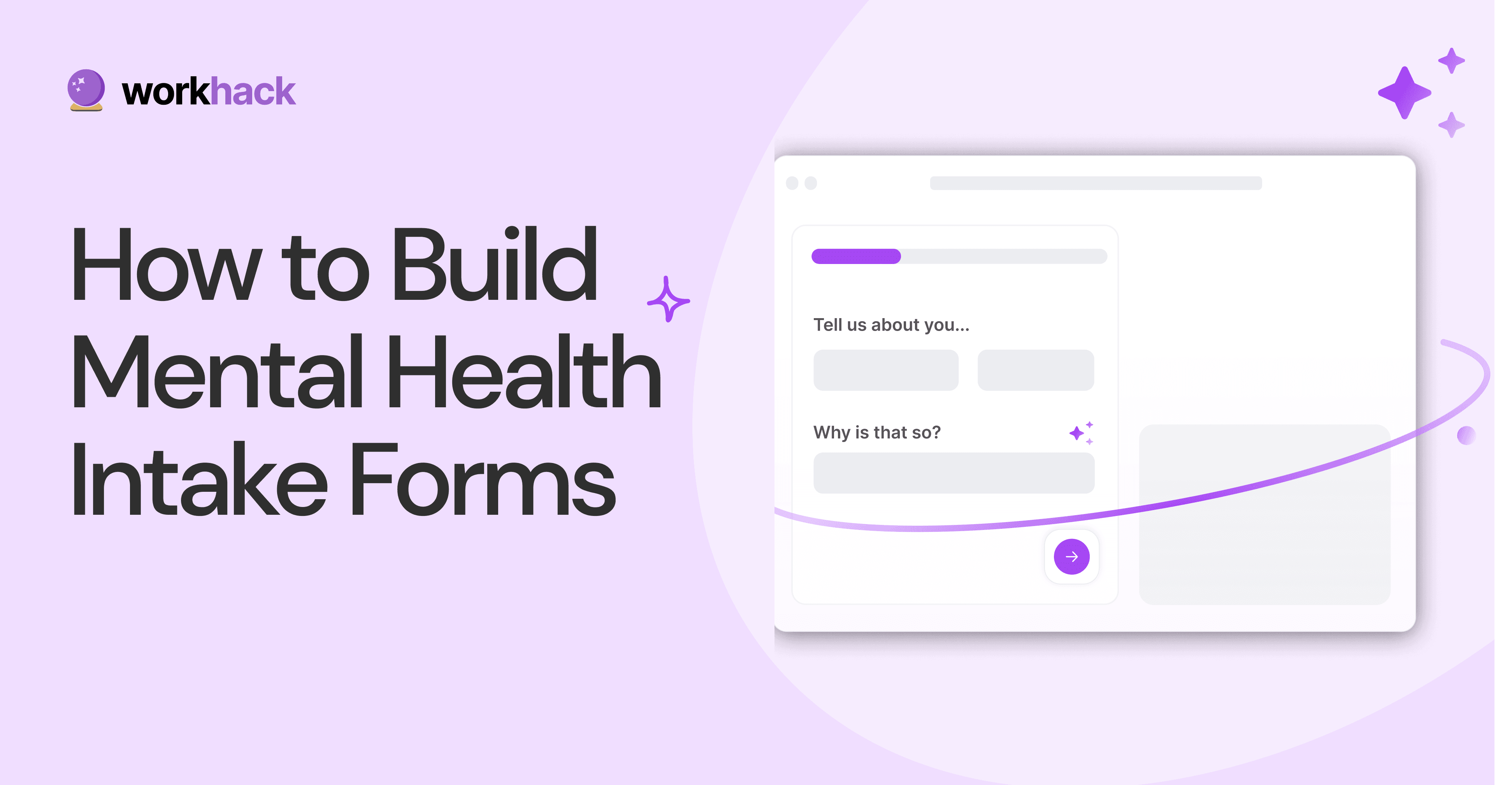
How to Build Mental Health Intake Forms?
Mental health intake forms are not like patient intake forms. Mental health intake forms deal with far more sensitive data and have specific design methods.
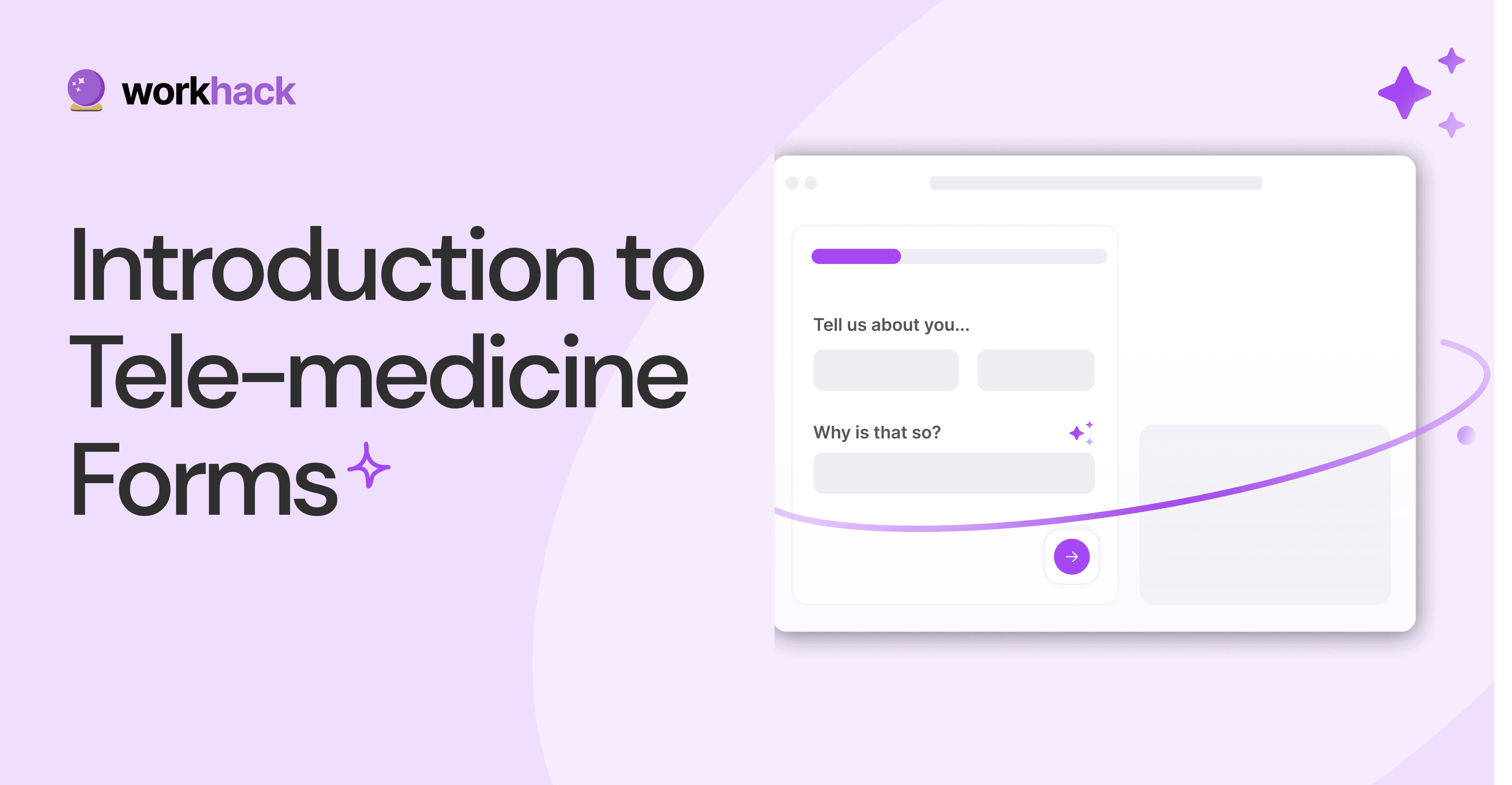
What, Why and How of Telemedicine Forms.
Telemedicine is on the rise and with different form builders out there, which one best suits your needs as a healthcare services provider?
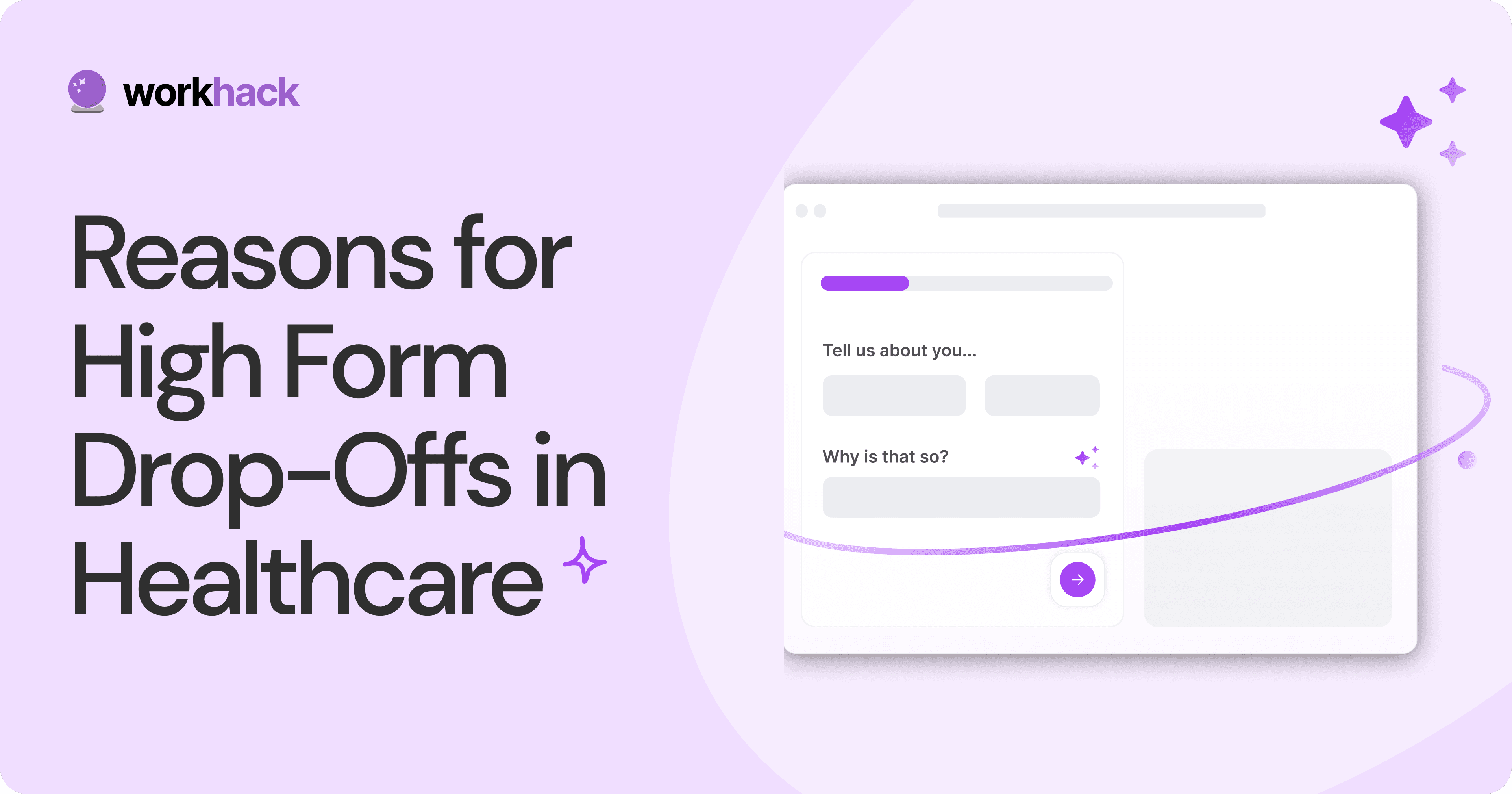
3 Reasons for Major Drop-Offs in Medical Forms.
No matter which healthcare form we pick, there are major drop-off reasons. We shall dive into the top 3 and learn how to resolve them in your next form.
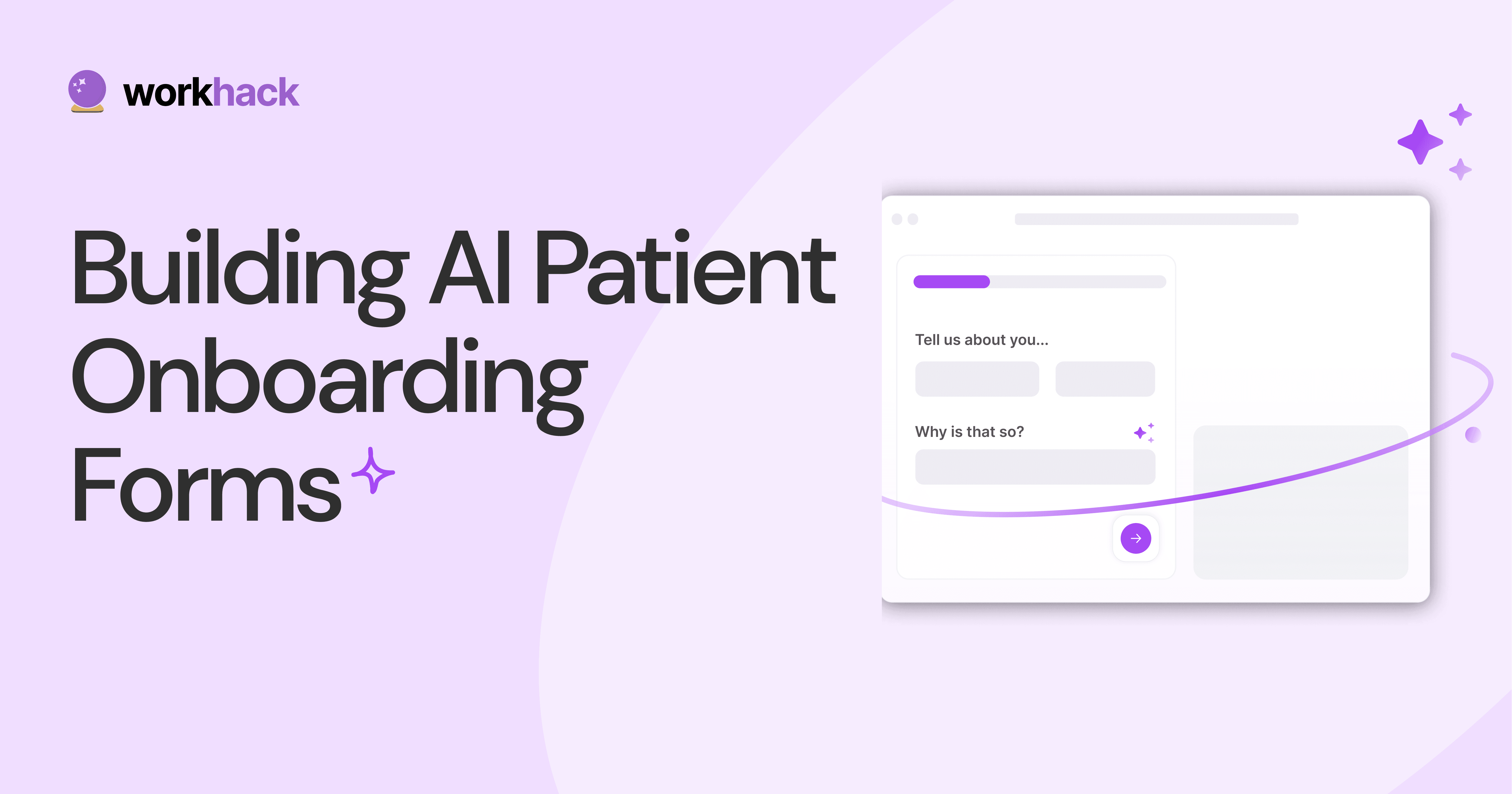
Patient Onboarding Forms - From Click to Clinic.
Patient onboarding forms are the first touchpoint for patients; getting this right for higher conversion rates is a must-have. Learn how to perfect them now.

5 Key Parts of a Good Patient Satisfaction Form.
The goal of patient satisfaction surveys is to course-correct the services of a healthcare provider. Patient feedback leads to a culture of patient-centric care.
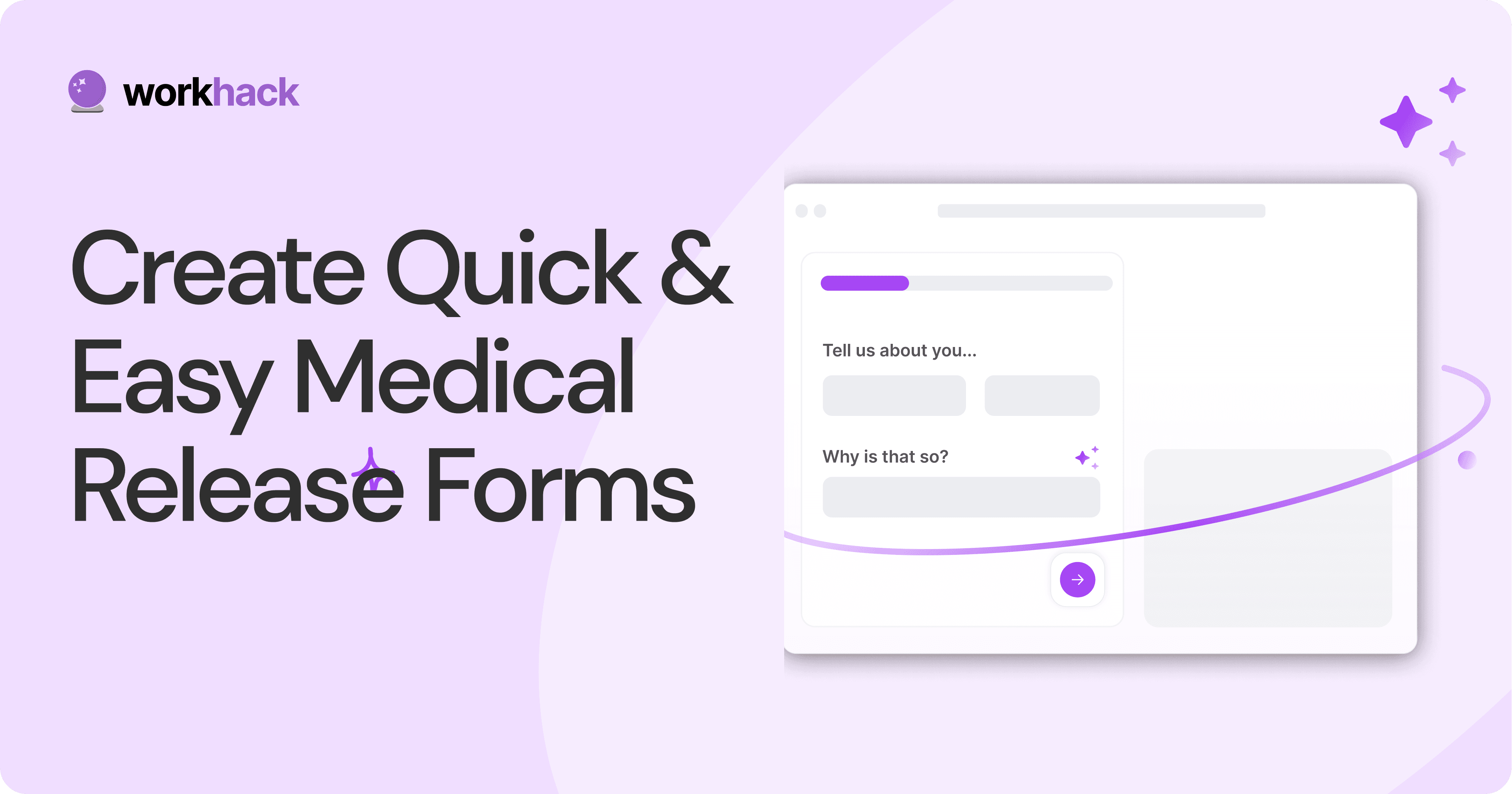
Build Quick and Easy Medical Release Forms.
Every HIPAA-compliant healthcare provider comes across medical release forms that involve details from medical history forms. Can they be shipped fast? Yes.

Nine Types of Healthcare and Medical Forms.
Medical forms are a must-have for any healthcare business or practitioner. Learn about the different kinds of medical and healthcare forms.

4 Tips for Better Medical History Forms.
Medical history forms are central to patient care, onboarding, and medical administration records. Learn how to make them easier to fill.

How to Build Mental Health Intake Forms?
Mental health intake forms are not like patient intake forms. Mental health intake forms deal with far more sensitive data and have specific design methods.

What, Why and How of Telemedicine Forms.
Telemedicine is on the rise and with different form builders out there, which one best suits your needs as a healthcare services provider?

3 Reasons for Major Drop-Offs in Medical Forms.
No matter which healthcare form we pick, there are major drop-off reasons. We shall dive into the top 3 and learn how to resolve them in your next form.

Patient Onboarding Forms - From Click to Clinic.
Patient onboarding forms are the first touchpoint for patients; getting this right for higher conversion rates is a must-have. Learn how to perfect them now.

5 Key Parts of a Good Patient Satisfaction Form.
The goal of patient satisfaction surveys is to course-correct the services of a healthcare provider. Patient feedback leads to a culture of patient-centric care.

Build Quick and Easy Medical Release Forms.
Every HIPAA-compliant healthcare provider comes across medical release forms that involve details from medical history forms. Can they be shipped fast? Yes.

Nine Types of Healthcare and Medical Forms.
Medical forms are a must-have for any healthcare business or practitioner. Learn about the different kinds of medical and healthcare forms.

4 Tips for Better Medical History Forms.
Medical history forms are central to patient care, onboarding, and medical administration records. Learn how to make them easier to fill.

How to Build Mental Health Intake Forms?
Mental health intake forms are not like patient intake forms. Mental health intake forms deal with far more sensitive data and have specific design methods.

What, Why and How of Telemedicine Forms.
Telemedicine is on the rise and with different form builders out there, which one best suits your needs as a healthcare services provider?

3 Reasons for Major Drop-Offs in Medical Forms.
No matter which healthcare form we pick, there are major drop-off reasons. We shall dive into the top 3 and learn how to resolve them in your next form.

Patient Onboarding Forms - From Click to Clinic.
Patient onboarding forms are the first touchpoint for patients; getting this right for higher conversion rates is a must-have. Learn how to perfect them now.

5 Key Parts of a Good Patient Satisfaction Form.
The goal of patient satisfaction surveys is to course-correct the services of a healthcare provider. Patient feedback leads to a culture of patient-centric care.

Build Quick and Easy Medical Release Forms.
Every HIPAA-compliant healthcare provider comes across medical release forms that involve details from medical history forms. Can they be shipped fast? Yes.

Nine Types of Healthcare and Medical Forms.
Medical forms are a must-have for any healthcare business or practitioner. Learn about the different kinds of medical and healthcare forms.

4 Tips for Better Medical History Forms.
Medical history forms are central to patient care, onboarding, and medical administration records. Learn how to make them easier to fill.

How to Build Mental Health Intake Forms?
Mental health intake forms are not like patient intake forms. Mental health intake forms deal with far more sensitive data and have specific design methods.

What, Why and How of Telemedicine Forms.
Telemedicine is on the rise and with different form builders out there, which one best suits your needs as a healthcare services provider?

3 Reasons for Major Drop-Offs in Medical Forms.
No matter which healthcare form we pick, there are major drop-off reasons. We shall dive into the top 3 and learn how to resolve them in your next form.

Patient Onboarding Forms - From Click to Clinic.
Patient onboarding forms are the first touchpoint for patients; getting this right for higher conversion rates is a must-have. Learn how to perfect them now.

5 Key Parts of a Good Patient Satisfaction Form.
The goal of patient satisfaction surveys is to course-correct the services of a healthcare provider. Patient feedback leads to a culture of patient-centric care.

Build Quick and Easy Medical Release Forms.
Every HIPAA-compliant healthcare provider comes across medical release forms that involve details from medical history forms. Can they be shipped fast? Yes.
Subscribe to stay updated.
Subscribe to stay updated.
Subscribe to stay updated.
HC

HC

HC

HC

70+ people from across industries read our emails.
HC

HC

70+ people from across industries read our emails.
HC

HC

HC

70+ people from across industries read our emails.




Bangalore, India / San Francisco, US
WorkHack Inc. 2023
Bangalore, India
San Francisco, US
WorkHack Inc. 2023
WorkHack Inc. 2023
Bangalore, India / San Francisco, US
WorkHack Inc. 2023
Bangalore, India / San Francisco, US



